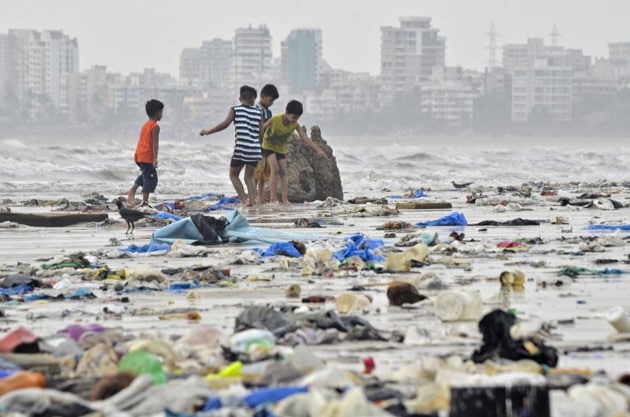Waste side story: Garbage trucks make Mumbai’s air even more toxic
Numerous studies over the past decade have found how GHG emissions, including pollutants found in this study, are not only a cause for climate change, but also cause health ailments.
Diesel vehicles transporting waste in the city generate toxic pollutants equivalent to 8.74 lakh vehicles driven for one year.

The Environmental Science and Engineering Department (CESE) of the Indian Institute of Technology Bombay (IIT-B) conducted a study of 7,092 trips made each day by 1,144 waste transport vehicles (989 private and 155 municipal vehicles) over a year. Their emissions were analysed for pollutants such as carbon dioxide (CO2), carbon monoxide (CO), hydrocarbons (HC), nitrogen oxide (NOx), and particulate matter (PM).
Of the emissions, CO2 was the highest at 67,401.38 tonnes a year, equivalent to greenhouse gas (GHG) emissions from 14,310 passenger vehicles driven in one year. NOx emissions were the second highest at 613.51 tonnes a year, followed by CO, HC, and PM emissions at 579.11 tonnes a year, 107.36 tonnes a year, and 99.94 tonnes a year, respectively. Emissions from the five pollutants are equal to GHG emissions from burning of coal from 22,478 railcars or 8.74 lakh vehicles driven for one year, according to the United States Environmental Protection Agency greenhouse gas equivalencies calculator.
Currently, in Mumbai, solid waste is managed through open dumping (69%) and partly bioreactor landfill (31%), which generates approximately 2.47 million tonnes of CO2 a year, the study said. “We found that the transportation of waste alone generates 0.07 million tonnes of CO2 a year, which is approximately 2.8% of the total greenhouse emissions produced from current waste management practices in Mumbai,” said Munish Chandel, associate professor, CESE IIT-B and co-author of the study. “Overall, if you compare emission from waste transport to overall emissions from passenger transport in Mumbai, it should not be more than 1%. However, waste transport produces additional emissions and contributes towards traffic congestion.”
Numerous studies over the past decade have found how GHG emissions, including pollutants found in this study, are not only a cause for climate change, but also cause health ailments. “Direct exposure to the concoction of pollutants mentioned under the study can be directly damaging for the lungs and continuous exposure can be extremely detrimental for patients suffering from lung ailments, children or senior citizens,” said Dr Sanjeev Mehta, pulmonologist.
“Large diesel vehicles are being used because they are able withstand heavy load of waste to landfills. However, since the study period, a 20% reduction in large vehicles has been achieved through segregation and waste management at source. The use of smaller vehicles emitting fewer pollutants has risen. All other public utility vehicles are running on cleaner fuels,” said an official from BMC’s solid waste management department.
The study suggested that decentralised waste management was the only solution to improve overall air quality. “Generating less waste and reusing and recycling it will reduce waste disposal and transportation requirement. All solid waste treatment and processing technologies can be implemented better when waste is segregated, at least in wet, dry and hazardous household waste,” said Bhupendra Sharma, co-author of the study. “Emission from waste transportation, in Mumbai and Maharashtra, is an issue which has been flagged. We want to understand and study this carefully. We will be checking the availability of vehicles running on cleaner fuels and logistics of operating such vehicles as they have a high load-carrying capacity,” said Sudhir Shrivastava, chairman, MPCB. “The municipal corporation needs to invest in targeted fleet modernisation by phasing out older vehicles, and also introduce cleaner fuels,” said Anumita Roy Choudhury, executive director, Centre for Science and Environment, Delhi.

Stay updated with all the Breaking News and Latest News from Mumbai. Click here for comprehensive coverage of top Cities including Bengaluru, Delhi, Hyderabad, and more across India along with Stay informed on the latest happenings in World News.
Stay updated with all the Breaking News and Latest News from Mumbai. Click here for comprehensive coverage of top Cities including Bengaluru, Delhi, Hyderabad, and more across India along with Stay informed on the latest happenings in World News.





